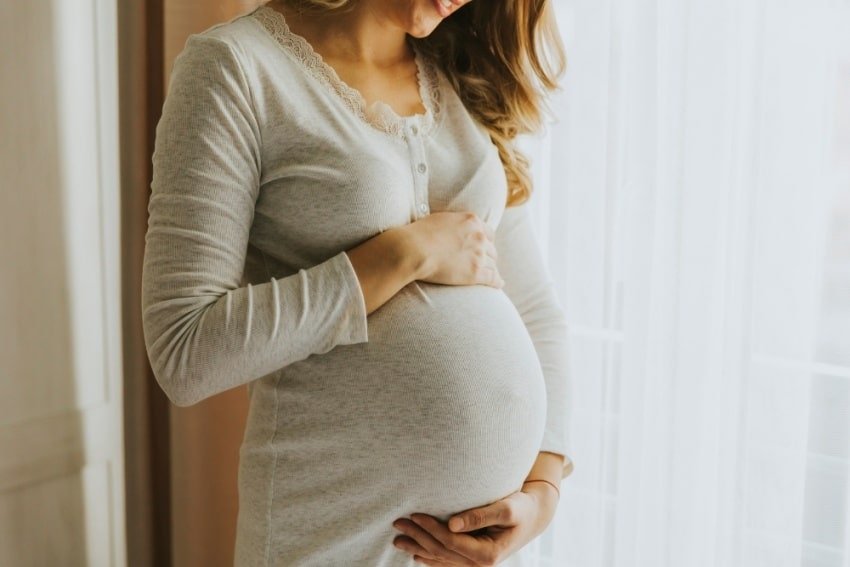Things start to feel a bit strange if you’re still having periods, and you can feel movement in your abdomen.
Many women go through this series of questions at some point in their lives, and there can be many culprits to cause this type of sensation in the abdomen.
If you’re wondering why you have a period and are also feeling flutters, kicks, or jolts in your stomach then we hope to put your mind at ease by offering the most likely scenarios for the situation at hand.
At the end of the day, you’ll want to see a physician confirm any assumptions you might have. But, this article will be your guide to get you through the next week or so of eagerness. In the meantime, get that appointment scheduled.
How Your Abdomen Might Feel If You’re Actually Pregnant
Even though you can’t technically have a full-blown period if you’re pregnant. You could have a bit of spotting or light bleeding about the same time your period is due.
If you weren’t already confused before, we bet you are now. So let’s clear it up together.
If you happen to have one of your eggs fertilized, it’s traveled all the way down the fallopian tube and now it’s time to take a journey to the next level: implantation!
Once a fertilized egg reaches the uterus it’ll be time for it to implant or burrow into the uterine wall.
As the egg burrows itself safely in the uterus wall, you could experience implantation bleeding as a result of the burrowing. It’s different for every female so is the amount of blood that gets shed during implantation.
Is implantation bleeding during pregnancy lighter or heavier than a period
Bleeding due to implantation is generally lighter than a heavy period. Yet, many women mistake it for their period – it depends on what kind of periods you’re used to having.
If you already have light periods, it can more easily be mistaken for the last period.
View in gallery
All of the confusion behind getting your period after becoming pregnant lies in this occurrence. Most women will call it their period when it’s really just a bit of the uterine wall being shed from the body at the start of pregnancy.
Aside from implantation bleeding, there is also decidual bleeding at the start of pregnancy
Another form of blood-shedding during pregnancy is through decidual bleeding. This happens to some women – though not often – during the first few months of pregnancy.
It’s often mistaken for a period because it comes during the times that a regular period would come.
Even though this is just a small layer of the blood being shed from the uterus, it’s enough to play off the possibility of pregnancy as negative in your mind. Until you start feeling movements in your lower abdomen.
Ladies Who’ve Had Babies Before Have Been Known to Feel Phantom Kicks
Some women feel jolts, kicks, and movement long after they’ve already had a baby – phantom kicks! These are so real to the women that do experience phantom kicks that they believe they are really pregnant.
Are there any other symptoms to look out for alongside phantom kicks
Yes, women will usually develop other symptoms along with the phantom kicks. Bloating in their abdomen or nausea is the most common symptom women will experience, just like in real pregnancy.
How long after pregnancy do women usually start to feel phantom kicks
Some women experience phantom kicks for many years after their pregnancy has ended, while other women will have just a few episodes of phantom kicking.
You can begin experiencing them at any point after you have given birth, while %40 of women say that they start feeling them after their first pregnancy.
On average women continued feeling phantom kicks for around 6 to 8 years before they resolved. The longest time frame a woman reported having felt phantom kicks was 28 years.
Most women felt phantom kicks as much as a few times a day, while others felt them about once a week.
Why do people feel phantom kicks?
Phantom kicks are a psychological condition that women who are having a hard time mentally or emotionally. In other words, there is a psychological imbalance when this happens. In turn, it causes women to feel false pregnancy symptoms.
Most commonly it happens if a woman has had a miscarriage, abortion, or stillbirth. Which is understandably challenging for a person. They don’t know for sure why it happens, but, it most likely resonates in the brain to body connection.
Scientists and researchers still don’t fully understand why this happens. It seems that once a woman has been pregnant before she will be expecting those sensations to happen even after the baby is outside of her body.
A Word From A Lady Who Has Felt Movements But Still Had Her Period
A mother reported on netmums.com that she felt like she was going a bit crazy. She already had three children and has been having a regular period all along. She became convinced that she is at least 4.5 months pregnant.
View in gallery
She wasn’t sure what was going on with her body, so she sought the advice of other mothers. She wanted to know if she was alone in this experience.
A slew of other mothers responded to her post saying that she wasn’t alone in this ordeal. They too have or do feel jolts, movements, and “kicks” regularly themselves.
Brainstorming With Women About The Source Of Unusual Abdominal Movements
If you’re feeling movements or funny sensations in your abdomen, but still have a period, thus feeling confused you aren’t alone! Many women report going through this at some point in their lives, and luckily we have the internet.
Having the internet means we all have access to online forums that talk about confusing topics. Let’s see what other women have to say are possible causes on this tricky topic.
Gas and intestinal discomforts
If you’re just experiencing a slew of gas, it will feel like a subtle pop in your abdomen. The gas passes relatively quickly and doesn’t generally return soon afterward.
On the other hand, fetal movements are regularly consistent and will return frequently throughout the day and start to feel familiar.
Muscle spasms could be the culprit
Muscle spasms happen when the muscles of the intestines, uterus, or pelvic area contract. This can feel quite similar to baby kicks at the beginning of pregnancy.
Muscle spasms happen for a variety of reasons, but most commonly for the following reasons;
Constipation, dehydration, ileus and gastroparesis, infectious colitis, inflammatory bowel disease, irritable bowel syndrome, ischemic enteritis, and muscle strain.
If any of these symptoms seem possible for you personally, you can schedule an appointment with your primary physician to discuss the possibilities.
Symptoms Women Get When They’re Newly Pregnant
If a woman becomes truly pregnant, there will be definite symptoms that can make it a bit more clear if pregnancy is indeed the reason why you’re feeling movements in your abdomen.
Due to implantation bleeding, you could still “have a period” even if you’re newly pregnant.
Cramps are a more definitive sign of pregnancy
Cramping is one of the most obvious signs of early pregnancy. As your uterus expands with the ever-growing egg women feel anywhere from a lot to a little bit of cramping along with the egg implants in the early days of pregnancy.
View in gallery
At this point, you wouldn’t know you have even missed a period yet, so it would seem that you aren’t pregnant in that aspect.
Wanting to sleep all the time is one of the first symptoms of pregnancy
When you first become pregnant you will also become extremely exhausted. The early days of pregnancy are filled with tired times that are obviously out of the normal.
This is often one of the first symptoms women notice before they have even missed a period. This is the type of tired that makes you want to fall asleep when you’ve had an easy day. It’s all due to the hormonal changes happening within your body.
Repulsed by foods you once loved and craving foods you’ve always disliked
If you’re finding that the foods you once loved don’t sound so great anymore, you might be pregnant.
You might have just had a period or implantation bleeding recently, and then start feeling sick to your stomach more often the following week.
Hormonal shifts start to happen right after the egg implants in your uterus. So, you might not even realize yet, that your period won’t be there next month.
Women find nausea and vomiting to be one of the first extreme symptoms experienced at the start of pregnancy. Unless you luck out – pay attention to those cravings and aversions to certain foods or smells!
In Conclusion
When a baby is first developing in your womb, it can be easy to mistake a bit of bleeding with your period. Since babies progress so rapidly you would probably be able to consistently feel their movements on a regular basis if you are indeed pregnant.
If you haven’t already, take a pregnancy test, and then keep on testing even if it comes back negative.
Some women find that their pregnancy test doesn’t show a solid positive result until they are further along – depending on how fast their body produces HCG.
If you keep getting negative results on your pregnancy test, then speak with your physician regarding other potential causes of feel movements in your stomach such as intestinal obstruction, an allergic reaction, ovulation, or even indigestion.
Sources
Can You Be Pregnant and Still Have a Period?
Getting Your Baby to Move at Different Stages of Pregnancy






